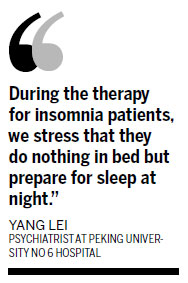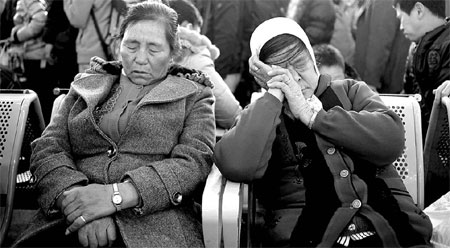Social networks bad for sleep
Updated: 2013-03-22 07:03
By Zheng Jinran in Beijing and Shi Yingying in Shanghai (China Daily)
|
||||||||
|
Passengers nap in a Beijing train station waiting room on Thursday, which was World Sleep Day. Wang Jing / China Daily |

Online social networks, chatting services and gaming are keeping young people up at night and disturbing their sleeping patterns, according to the 2013 China Sleep Quality Index from the Chinese Medical Doctor Association.
The report, released to mark World Sleep Day, which fell on Thursday, was based on interviews with more than 107,000 respondents in 20 cities, 20 counties and 20 rural areas across China.
It said more than 67 percent of the respondents send text messages or chat online when they are preparing for sleep, which is the major reason for staying up.
About one-third said online games, videos, stories or news tempt them to stay awake.
Many of the respondents, especially young people, said using such social network activities in bed keeps them from sleeping until midnight.
Zhang Ying, a civil servant working in Wuxi, Jiangsu province, usually spends hours on games like Angry Birds or Call of Duty on her smartphone or computer before sleep. "For me, playing games is relaxing after coming back from a long day at work, especially lying in bed," said the 25-year-old.
"But I always have dreams at night, making me tired in the morning," she said, adding that she usually sleeps for seven hours.
"I want to sleep early but can't resist the temptation."
Zhang likes the good graphics and complex plots, which lure her into playing for one or two hours every night.
According to the report, people like Zhang spend an average of 28 minutes on their cellphones, 49 minutes on their iPads and 73 minutes on their computers before they go to sleep.
Yet not many people realize the effects of these activities and about 30 percent of respondents believed it had no connection with their insomnia.
"They can have all these activities, but not in bed," said Yang Lei, a psychiatrist at Peking University No 6 Hospital.
"During the therapy for insomnia patients, we stress that they do nothing in bed but prepare for sleep at night," he said.
The report supported Yang's opinion and suggested that people need to keep away from digital devices for at least an hour before sleep since the lights stimulate their nerves, keep their brains in a state of excitement and disrupt their internal clock.
Chen Yejiong, a housewife in Shanghai, limited her eight-year-old daughter's time to play iPad games at night for the same reasons.
"My daughter doesn't have too much self-control and that's why I need to keep the time between 10 minutes to half an hour (every night) even if she has been crying and begging for the iPad," said Chen, adding the game keeps her daughter in an activated state.
In addition to the interruption of virtual social networks, actual social engagements lasting until dawn - including exciting activities such as karaoke - also contribute to urbanites' insomnia and makes them toss and turn at night.
Shanghai's health authority recently interviewed 1,000 white-collar workers aged 24 to 35, and more than one-third of them admitted they came back home after midnight from social activities at least once a week.
Too many social engagements keep them excited for at least one extra hour after the event, according to Xu Jian, a professor at Shanghai Traditional Chinese Medicine Hospital's insomnia department.
"They were too tired to go to sleep but now they're too excited to drop off," said Xu, adding that those suffering from insomnia are stressed when it gets late due to the fear of not being able to sleep, which only worsens the situation.
Another report by the Chinese Medical Doctors Association, which polled about 260,000 white-collar workers aged between 20 and 45 in Beijing, Shanghai, Guangzhou and Shenzhen through a combination of questionnaires and psychological checkups, found almost 80 percent of Chinese have poor quality sleep and 70 percent have a lackluster sex life.
Only 23 percent said they have good sleep quality, while the rest are afflicted by different sleep problems related to high blood pressure.
Ke Bo, vice-director of the Shenzhen Women and Children Psychological Health Service Center, who also runs the music therapy center, believes music therapy is a better alternative to insomnia than using a drug.
"People are usually listening to music consciously no matter if they focus on the music itself or regard it as background music," said Ke, who is also a member of the World Federation of Music Therapy, an international non-profit organization based in the United States.
"Its greater effects on one's physical and mental states, however, happen subconsciously," Ke said.
Contact the writers at zhengjingran@chinadaily.com.cn and shiyingying@chinadaily.com.cn
(China Daily 03/22/2013 page4)

 In Photos: 7.0-magnitude quake hits Sichuan
In Photos: 7.0-magnitude quake hits Sichuan
 Li Na on Time cover, makes influential 100 list
Li Na on Time cover, makes influential 100 list
 FBI releases photos of 2 Boston bombings suspects
FBI releases photos of 2 Boston bombings suspects
 World's wackiest hairstyles
World's wackiest hairstyles
 Sandstorms strike Northwest China
Sandstorms strike Northwest China
 Never-seen photos of Madonna on display
Never-seen photos of Madonna on display
 H7N9 outbreak linked to waterfowl migration
H7N9 outbreak linked to waterfowl migration
 Dozens feared dead in Texas plant blast
Dozens feared dead in Texas plant blast
Most Viewed
Editor's Picks

|

|

|

|

|

|
Today's Top News
Live report: 7.0-magnitude quake hits Sichuan, heavy casualties feared
Boston suspect cornered on boat
Cross-talk artist helps to spread the word
'Green' awareness levels drop in Beijing
Palace Museum spruces up
First couple on Time's list of most influential
H7N9 flu transmission studied
Trading channels 'need to broaden'
US Weekly

|

|








